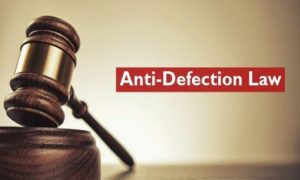Anti-Defection Law:

Jignesh Mewani, an independent MLA from Gujarat, has said he has joined the Congress “in spirit” as he could not formally do so, having been elected as an independent.
- The Tenth Schedule of the Constitution, popularly known as the anti-defection law, specifies the circumstances under which changing of political parties by legislators invites action under the law. It includes situations in which an independent MLA, too, joins a party after the election.
- The law covers three scenarios with respect to shifting of political parties by an MP or an MLA.
- The first is when a member elected on the ticket of a political party “voluntarily gives up” membership of such a party or votes in the House against the wishes of the party.
- The second is when a legislator who has won his or her seat as an independent candidate joins a political party after the election.
- In both these instances, the legislator loses the seat in the legislature on changing (or joining) a party.
- The third scenario relates to nominated MPs. In their case, the law gives them six months to join a political party, after being nominated. If they join a party after such time, they stand to lose their seat in the House.
- Disqualification: Under the anti-defection law, the power to decide the disqualification of an MP or MLA rests with the presiding officer of the legislature. The law does not specify a time frame in which such a decision has to be made.




